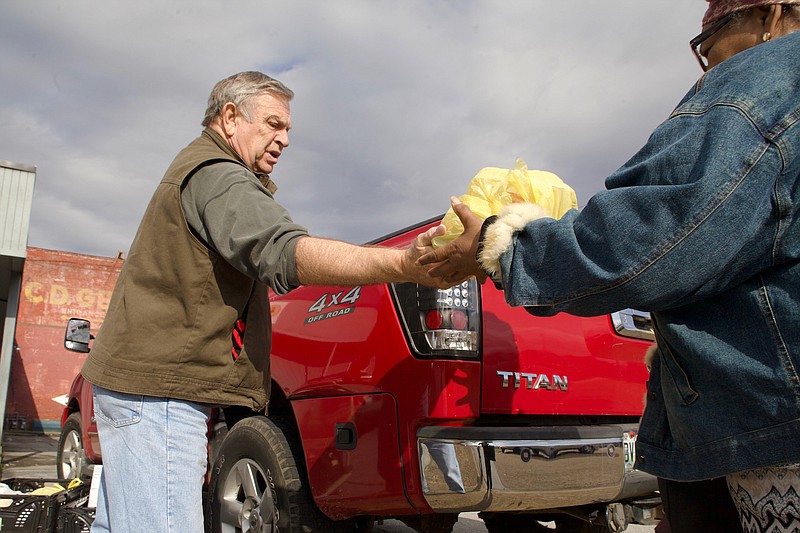JoAnn Brown loves her red truck - it takes her to doctor appointments, to visit friends and to halaqas.
The Nissan Titan provides the 73-year-old a sense of independence, she said, keeping her mind and body healthy.
But depending on decisions made 600 miles away in Washington, D.C., the Chattanooga resident could lose that feeling of freedom.
Last month, President Donald Trump proposed cutting $182 billion from the Supplemental Nutrition Assistance Program in the next 10 years, reducing benefits for participants with the support of the U.S. Department of Agriculture. Advocates say slashing SNAP funding will hurt senior citizens the most.
Like Brown, hundreds of other seniors in Chattanooga rely on local food banks to fill the gap between their SNAP benefits and their hunger. Nearly 8% of seniors in the nation are food insecure, according to Feeding America. Tennessee outpaces the country with more than 10% of seniors being food insecure, according to the Tennessee Justice Center.
In January, Brown's SNAP benefits were cut by $10 after Social Security adjusted its benefits. Her checks, now around $140, rarely last her a month, she said.
Further cuts to SNAP would force changes in Brown's life - no longer using a dryer in her home, going to food banks more and driving her truck less. She may even have to sell it.
"I would have to take my gas money to buy food," she said.
Politicians in city halls or congressional buildings deciding to cut budgets put the most hurt on the people with the least, Brown said.
Some seniors gathered recently at Metropolitan Ministries said they did not apply for SNAP because the benefit checks are not worth the trouble. Nearly 85 percent of elderly SNAP recipients live alone and receive on average $105 a month, about half of what single adults receive, according to the USDA.
Lenard Wigfall collects an $18 check each month, a benefit that has steadily decreased since the 65-year-old joined SNAP in 2012. He makes those dollars go as far as they can, buying chicken rather than the pork chops he prefers, for example. He visits food banks, especially during the winter when utility bills are high, he said.
"Eighteen dollars, if I go to the store, that wipes that out with two or three things," Wigfall said.
READ MORE: Hamilton County food stamp participation drops by a third in past seven years
If individuals' benefits are decreased, local food banks will be pressured to make up the difference, said Rebecca Whelchel, Metropolitan Ministries executive director. Organizations such as hers will need to spend more of their limited budgets on food, meaning fewer services for other Chattanooga residents, she said.
Smaller checks may cause fewer seniors to apply for the program, a problem since meeting SNAP's eligibility requirements opens doors to other assistance programs, such as receiving a free phone, Whelchel said.
"Losing those benefits has a multiplier effect," she said.
Last year, nearly 5,000 people, including seniors, used Metropolitan Ministries' food vouchers or food bank. More than 132,000 people in a 20-county region of Southeast Tennessee and Northwest Georgia are considered food insecure, according to the USDA.
However, the organization overseeing SNAP supports Trump's planned cuts to the assistance program. U.S. Secretary of Agriculture Sonny Perdue praised Trump's budget proposal shortly after it was released.
"President Trump's budget continues to rein in an overgrown Federal government with fiscally responsible cuts in spending," Perdue said in a Feb. 10 statement. "We will continue to serve and deliver our programs on behalf of America's farmers, ranchers, producers, foresters, and the food insecure with improved customer service and respect for taxpayer dollars."
SNAP participation in Tennessee has dropped by a third since 2013, during the height of the Great Recession. In this year's State of the Union address, Trump said his administration removed 7 million people from SNAP through the nation's strong economy.
More SNAP changes
Starting in April, the USDA will begin enforcing work requirements for SNAP - requiring all able-bodied adults without dependents ages 18 to 49 to be in a workforce training program, volunteering or working 20 hours per week. The change would make nearly 700,000 Americans ineligible. A group of 14 states is currently suing the federal government to block the changes to SNAP. Sky Arnold, Tennessee Department of Human Services spokesperson, said the department is monitoring the lawsuit but still preparing for the rule to go into effect, including planning job fairs in March for the affected counties in Tennessee. At this time, no DHS job fairs are planned for Hamilton County.
U.S. Sen. Marsha Blackburn, R-Tennessee, said in a statement Trump's proposal includes "common sense reforms," which include work or school requirements until age 65.
"We must keep in mind that the national debt is now over $23 trillion and poses a severe risk to our economic and national security," Blackburn said in the statement. "We are working to reduce spending levels by passing a balanced budget amendment and continue to promote pro-growth policies to bring down the national debt."
Randall Fleming said he can stretch his SNAP benefits to last the full month, buying bread and dried beans usually because he knows those products will last. When he can, he will buy bacon, milk and Apple Jacks, the favorites of his 8-year-old daughter, Fleming said.
The 64-year-old will be "back to the drawing board" if the proposed budget cut goes through, he said.
"God forbid they take it all away now," Fleming said.
Contact Wyatt Massey at wmassey@timesfreepress.com or 423-757-6249. Follow him on Twitter @news4mass.

